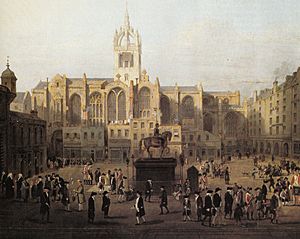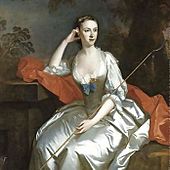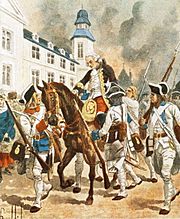Chevalier de Johnstone facts for kids
Quick facts for kids
James Johnstone, Chevalier de Johnstone
|
|
|---|---|

Johnstone's home town of Edinburgh, ca 1770
|
|
| Nickname(s) | Johnstone de Moffatt |
| Born | 25 July 1719 Edinburgh |
| Died | ca 1791 Paris |
| Allegiance | |
| Service/ |
|
| Years of service | 1745-1746 and 1750-1760 |
| Rank | Lieutenant |
| Unit | Compagnies Franches de la Marine 1750-1760 |
| Battles/wars | Jacobite rising of 1745 Prestonpans Falkirk Culloden French and Indian War Seven Years' War Louisbourg Plains of Abraham |
| Awards | Order of Saint Louis, 1761 |
| Relations | Lady Jane Douglas (ca 1698-1753) John, 6th Lord Rollo (1708-1783) |
James Johnstone (1719 – around 1791) was also known as Chevalier de Johnstone. He was born in Edinburgh, Scotland. He became famous for his part in the 1745 Jacobite Rising, a rebellion to put Prince Charles Edward Stuart on the British throne.
After the rebellion failed, Johnstone escaped to France. In 1750, he joined the French army and served in French North America, which is now Canada. He was a Lieutenant and fought in important battles during the French and Indian War.
His military career wasn't very special, and he stayed a lieutenant for ten years. After the French lost Quebec in 1760, he went back to France and left the army. We don't know much about his later life, but he probably died in Paris around 1791. He is best remembered for his book, Memoirs of the rebellion in 1745 and 1746, which was published after his death.
Contents
About James Johnstone
James Johnstone was born on July 25, 1719. His father, Jeremy Boone Johnstone, was a merchant in Edinburgh. His mother was a distant relative of Lady Jane Douglas, a well-known figure of that time.
James had two sisters. His older sister, Cecilia, married John Rollo, who later became the 6th Lord Rollo. His other sister, Jean, married Hugh Leslie. There is no record that James Johnstone ever married or had children.
Johnstone's Career

We don't know much about Johnstone's early life, except what he wrote in his own book. He said he was not a good student and spent too much money. He had a difficult relationship with his father. However, his mother and Lady Jane Douglas were kind to him and even lent him money.
In 1738, he went to Saint Petersburg, Russia, to stay with his uncle, James Hewitt, who was a Scottish merchant. Another uncle, Gustav Otto Douglas, was a Russian general. This uncle offered Johnstone a job in the Russian army. But his father said he would not give him any money if he joined. So, Johnstone returned to Edinburgh in 1740.
Joining the Jacobite Rising
Johnstone's sister married into the Rollo family. This family was connected to the Jacobite gentry in Perthshire, Scotland. Many people from this area joined the 1745 Rising.
Johnstone joined the Jacobites when they reached Perth in September 1745. He became a captain in the Duke of Perth's regiment. He was with the Jacobite army throughout their campaign, even when they marched into England.
At the Battle of Culloden in April 1746, Johnstone said he took part in the attack. After the battle, he escaped by taking someone else's horse.
Escape to France
Johnstone went to Ruthven Barracks with about 1,500 other Jacobite survivors. On April 20, Prince Charles told them to go home and wait for him to return with more help from France. Johnstone hid in the Scottish Highlands for several weeks.
He eventually reached Edinburgh, where his friend Lady Jane Douglas helped him escape to London. He saw Jacobite soldiers being taken for execution in London. Disguised as one of Lady Jane's servants, he finally reached The Hague in the Netherlands, where they parted ways.
Service in New France
Johnstone had planned to go back to Russia, but he stayed in Paris. In 1750, he got a job as an ensign in the Compagnies Franches de la Marine. These were French soldiers sent to serve in French North America. Johnstone was sent to Île-Royale, which is now part of Nova Scotia, Canada.
He often complained in his book that he was treated unfairly. But he was promoted to Lieutenant in 1754.
The French and Indian War began in 1754 between Britain and France. This war was part of a bigger global conflict called the Seven Years' War. When the British captured Louisbourg in June 1758, Johnstone was on Prince Edward Island. He escaped to Quebec.
He served under Montcalm, the French commander at Quebec. Montcalm died on September 13 during the Battle of the Plains of Abraham. Even though the British knew Johnstone was Scottish, they allowed him to return to France in October 1760.
Later Life and Memoirs
After France lost North America, Johnstone's military unit was disbanded. He received a small pension and was given the Order of Saint Louis in 1762. Even though he often said he loved military life, his career wasn't very successful, and it ended there.
We don't know much about his life after that. He visited Scotland in 1779 but didn't seem to have much contact with his family. His pension was reduced in the 1770s because the French government had money problems. It was stopped completely after the French Revolution in 1789 but was later given back to him.
It is believed he died in Paris, but the exact date is not known. He is not recorded after 1791.
Johnstone left his writings at the Scots College in Paris. His most famous work, Memoirs of the rebellion in 1745-46, was translated into English and published in 1822. In his memoirs, he often complained about unfairness and focused a lot on himself. But his writings are lively and sometimes offer interesting insights. He didn't like Prince Charles, but he admired Lord George Murray, another Jacobite leader. However, he noted that Murray had a quick temper and was stubborn.
Other writings about his time in Canada were published in Quebec in 1887. These included The Campaign of 1760 in Canada and A dialogue in Hades: a parallel of military errors, of which the French and English armies were guilty, during the campaign of 1759, in Canada.
 | Kyle Baker |
 | Joseph Yoakum |
 | Laura Wheeler Waring |
 | Henry Ossawa Tanner |


